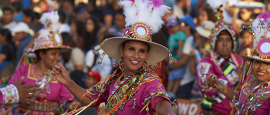Bolivia Food and Drink
Bolivia’s cuisine is as distinctive and varied as its landscape. Local specialities differ depending what region you find yourself in: the highlands and lowlands each have their own flavours. Aymaran cuisine in the Andes and Altiplano is centred on carbohydrates – especially potatoes, rice and quinoa – and meat (mutton and llama). Food in the lowlands tends to be more tropical (yucca and plantain are staples) with beef featuring heavily on menus.
You will find a large range of national and international restaurants, especially in La Paz and other large cities. It is possible to find pizzerias, Chinese restaurants (known as chifas) and high-end eateries, as well as more rustic rotisserie chicken restaurants.
Vegetarian options are thin on the ground (though there are a lot of egg-based dishes) outside the main cities. While Bolivia is landlocked, fish is still readily available, including delicious trout available from Lake Titicaca. For the best deals dine at a local market or plump for a set lunch menu.
Salteñas: Pasties filled with meat, vegetables, sauce, olives and hard-boiled egg.
Api con buñuelos: Sweet, hot maize drink with cinnamon, sometimes served with deep-fried pancakes.
Chuño: A naturally freeze-dried potato, which is nutty in flavour and often used in a soup called chairo.
Llajwa: A hot chilli sauce served with most dishes.
Chorizos chuquisaqueños: Pork sausages in a spicy sauce.
Lomomontado: Fried tenderloin steak served with a fried egg and chopped tomato on top.
Cuñape: A pastry made from cheese and yucca flour.
Surubí: A meaty white fish from the Amazonian rivers.
Picante de pollo: Southern-style fried chicken, fried potatoes, rice, tossed salad with hot peppers.
Lechón al horno: Roasted suckling pig served with sweet potato and fried plantains.
Charquekan: Llama or beef jerky, served fried with jacket potatoes, cheese and llajwa.
Mate: A herbal tea, usually made from the coca leaf which helps with altitude sickness.
Chicha: A fermented maize beer available in the Cochabamba region. It’s an acquired taste with a bittersweet flavour.
Singani: A popular brandy made from fermented grapes. Used in cocktails and great with lemonade.
Wine: Bolivia has a fledgling wine industry, but imported wines from Argentina and Chile are also available.
La Concepción: A high-altitude wine from Tarija.
Do you have any Feedback about this page?
© 2025 Columbus Travel Media Ltd. All rights reserved. No part of this site may be reproduced without our written permission, click here for information on Columbus Content Solutions.




 You know where
You know where